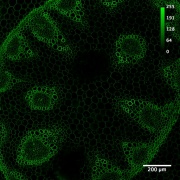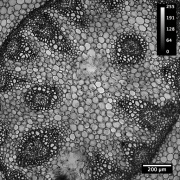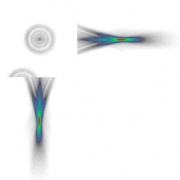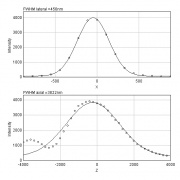Advanced system check
| Line 1: | Line 1: | ||
MPI-CBG LMF | MPI-CBG LMF | ||
| − | Advanced System Check | + | Advanced System Check Protocol (draft) |
| − | + | ||
| − | + | ||
[[image:Conva10xok.jpg with bar.jpg|thumb]] | [[image:Conva10xok.jpg with bar.jpg|thumb]] | ||
[[image:Conva10xok-1.jpg with bar.jpg|thumb]] | [[image:Conva10xok-1.jpg with bar.jpg|thumb]] | ||
| − | + | == Fluorescence and Brightfield Imaging == | |
**purpose: test general performance of the system - basic functions work fine? + Koehler illumination, light paths ok? | **purpose: test general performance of the system - basic functions work fine? + Koehler illumination, light paths ok? | ||
**requirements: Zeiss/Leica Convallaria demo sample | **requirements: Zeiss/Leica Convallaria demo sample | ||
**work flow: acquire two images in basic resolution (512x512), blue ex / green em plus transmitted light image, using 10x objective | **work flow: acquire two images in basic resolution (512x512), blue ex / green em plus transmitted light image, using 10x objective | ||
| − | + | == Field of Illumination == | |
** purpose: check for even illumination | ** purpose: check for even illumination | ||
** requirements: mirror | ** requirements: mirror | ||
** work flow: 80/20 mirror, 488 nm laser, pinhole 1 AU. focus on reflective side of mirror. try to obtain "japanese flag". | ** work flow: 80/20 mirror, 488 nm laser, pinhole 1 AU. focus on reflective side of mirror. try to obtain "japanese flag". | ||
| − | + | == Point Spread Function (PSF) == | |
**purpose: | **purpose: | ||
**requirements: | **requirements: | ||
| Line 24: | Line 22: | ||
**work flow: open pinhole(s), use high resolution apochromatic lens (NA 1.2 or above), acquire two images (UV/V plus VIS channel) with good sampling (pixel size ~100nm) | **work flow: open pinhole(s), use high resolution apochromatic lens (NA 1.2 or above), acquire two images (UV/V plus VIS channel) with good sampling (pixel size ~100nm) | ||
| − | == PSF Macro == | + | === PSF Macro === |
[[image:2009-09-29 MPI11 63x 1.4 FWHMa 3822nm - FWHMl 456nm.jpg|thumb|PSF macro result: 500 nm bead, confocal]] | [[image:2009-09-29 MPI11 63x 1.4 FWHMa 3822nm - FWHMl 456nm.jpg|thumb|PSF macro result: 500 nm bead, confocal]] | ||
[[image:2009-09-29 MPI11 63x 1.4 FWHMa 3822nm - FWHMl 456nm graphs.jpg|thumb|PSF macro result 2: 500 nm bead, confocal]] | [[image:2009-09-29 MPI11 63x 1.4 FWHMa 3822nm - FWHMl 456nm graphs.jpg|thumb|PSF macro result 2: 500 nm bead, confocal]] | ||
| − | === requirements for bead stacks === | + | ==== requirements for bead stacks ==== |
* 100 planes, 200 nm spacing | * 100 planes, 200 nm spacing | ||
* optimal: single bead in center of image | * optimal: single bead in center of image | ||
* the macro attempts to crop a 15x15 µm area with the bead in center; if the image dimensions are already smaller, extend the area: Fiji > Image > Adjust > Canvas Size... | * the macro attempts to crop a 15x15 µm area with the bead in center; if the image dimensions are already smaller, extend the area: Fiji > Image > Adjust > Canvas Size... | ||
| − | === install LUT === | + | ==== install LUT ==== |
* Mac: go to applications folder > fiji: ctrl+click on the Fiji(.app) icon > Show package content | * Mac: go to applications folder > fiji: ctrl+click on the Fiji(.app) icon > Show package content | ||
* PC: go to \Program Files\Fiji.app (or to the place you installed Fiji) | * PC: go to \Program Files\Fiji.app (or to the place you installed Fiji) | ||
| Line 37: | Line 35: | ||
* drag and drop the *.lut into it | * drag and drop the *.lut into it | ||
* (re)start fiji | * (re)start fiji | ||
| − | === install macro === | + | ==== install macro ==== |
* Fiji > Plugins > Macros > Install... | * Fiji > Plugins > Macros > Install... | ||
* select macro txt file | * select macro txt file | ||
* macro gets installed to that menu for the current session | * macro gets installed to that menu for the current session | ||
| − | === load bead stack === | + | ==== load bead stack ==== |
* Fiji > File > Open | * Fiji > File > Open | ||
* select bead stack file | * select bead stack file | ||
* if necessary, split channels (Fiji > Image > Color > Split Channels) | * if necessary, split channels (Fiji > Image > Color > Split Channels) | ||
* if necessary, crop image to a single bead | * if necessary, crop image to a single bead | ||
| − | === run macro === | + | ==== run macro ==== |
[[image:Set parameters.jpg|thumb|PSF macro: parameters dialog, open bead stack]] | [[image:Set parameters.jpg|thumb|PSF macro: parameters dialog, open bead stack]] | ||
| − | === description by Laurent === | + | ==== description by Laurent ==== |
Thanks a lot for your interest in our ImageJ Macro, which I join as an attachment. | Thanks a lot for your interest in our ImageJ Macro, which I join as an attachment. | ||
| Line 87: | Line 85: | ||
name_Magnification_NA.jpg. | name_Magnification_NA.jpg. | ||
| − | + | == Z-Resolution == | |
| − | + | ||
| − | + | ||
*leica mirror | *leica mirror | ||
Revision as of 09:49, 30 September 2009
MPI-CBG LMF
Advanced System Check Protocol (draft)
Contents |
Fluorescence and Brightfield Imaging
- purpose: test general performance of the system - basic functions work fine? + Koehler illumination, light paths ok?
- requirements: Zeiss/Leica Convallaria demo sample
- work flow: acquire two images in basic resolution (512x512), blue ex / green em plus transmitted light image, using 10x objective
Field of Illumination
- purpose: check for even illumination
- requirements: mirror
- work flow: 80/20 mirror, 488 nm laser, pinhole 1 AU. focus on reflective side of mirror. try to obtain "japanese flag".
Point Spread Function (PSF)
- purpose:
- requirements:
- work flow:
- overlay UV/V and VIS (confocal systems with separate UV/V laser coupling)
- purpose: check the coupling precision of the UV/V laser
- requirements: 0.2/0.5µm fluorescent beads sample
- work flow: open pinhole(s), use high resolution apochromatic lens (NA 1.2 or above), acquire two images (UV/V plus VIS channel) with good sampling (pixel size ~100nm)
PSF Macro
requirements for bead stacks
- 100 planes, 200 nm spacing
- optimal: single bead in center of image
- the macro attempts to crop a 15x15 µm area with the bead in center; if the image dimensions are already smaller, extend the area: Fiji > Image > Adjust > Canvas Size...
install LUT
- Mac: go to applications folder > fiji: ctrl+click on the Fiji(.app) icon > Show package content
- PC: go to \Program Files\Fiji.app (or to the place you installed Fiji)
- create a folder called "luts", if it's not there yet
- drag and drop the *.lut into it
- (re)start fiji
install macro
- Fiji > Plugins > Macros > Install...
- select macro txt file
- macro gets installed to that menu for the current session
load bead stack
- Fiji > File > Open
- select bead stack file
- if necessary, split channels (Fiji > Image > Color > Split Channels)
- if necessary, crop image to a single bead
run macro
description by Laurent
Thanks a lot for your interest in our ImageJ Macro, which I join as an attachment.
You need to install it each time you start ImageJ. Go to >Plugins>Macros>Install...
Select it in the dialog window and click "open".
To run it, you need before to open a stack. We take stacks of 100 planes, spaced by 0.2mm, for all objectives and all microscopes. Then go to >Plugins>Macros>MIPs for PSFs for all microscopes to run the Macro.
Automatic Macro actions / User actions:
A. Selects the plane with the highest pixel intensity, adjusts display settings, opens the information dialog box.
1. Enter information in the dialog window which popped up.
2. Zoom in the image to clearly localize the center of the bead (you can also navigate between planes if needed).
3. Right clicks with the mouse on the center of the bead.
B. Crops the image to get 15mmx15mm area centered over the pixel clicked by the user.
C. Makes projections in X and Y of the stack
D. Stitches together the cropped area and the projections
E. Estimates and subtracts background
F. Takes the square root of the image (to minimize photon noise and to mimic a decrease in histogram gain)
G. Resizes the image to 550x550 pixels, adjusts display, changes LUT and saves the picture in a JPEG format with a standardized name: Date_Scope name_Magnification_NA.jpg.
Z-Resolution
- leica mirror
- XZY Scan
- Zoom 16.00
- 30% 488nm laser
- 30/70 splitter
- pmt 1 > detection slit around 488nm
- scan speed 200 Hz
- line average 4
- 512x256
- 8 bit
- min pinhole diameter!
results @ 1/2 maximum of intensity (+ theoretical leica value):
100x/1.4 oil > 486 nm (235.8 nm) 63x/1.32 oil > 660 nm (285.8 nm) 40x/1.25 oil > 836 nm (334.4 nm) 10x/0.3 dry > 1021 nm (4767.6 nm)




